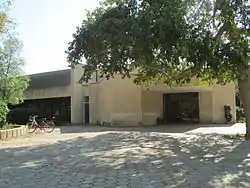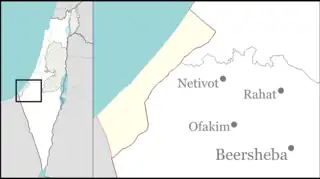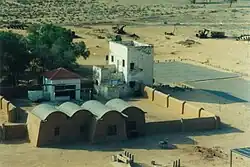Gvulot
Gvulot (Hebrew: גְּבוּלוֹת, lit. "Borders") is a kibbutz in southern Israel. Located in the north-western Negev desert, it falls under the jurisdiction of Eshkol Regional Council. In 2021 it had a population of 399. Gvulot is located about 120 m above sea level.[2]
Gvulot
גְּבוּלוֹת | |
|---|---|
 | |
 Gvulot | |
| Coordinates: 31°12′37″N 34°27′58″E | |
| Country | Israel |
| District | Southern |
| Council | Eshkol |
| Affiliation | Kibbutz Movement |
| Founded | 12 May 1943 |
| Founded by | Romanian and Turkish Jews |
| Population (2021)[1] | 399 |
| Website | www.gvulot.org |

History
The village was established on land owned by the Jewish National Fund (JNF) on 12 May 1943 by immigrants from Romania and Turkey, who were members of the "Kibbutz Eretz Israel Gimel" group of Hashomer Hatzair, with financial assistance from Keren Hayesod. Initially named Mitzpe Gvulot (Hebrew: מִצְפֶּה גְּבוּלוֹת, lit. Borders lookout), it was the first of the three lookouts, the others being Beit Eshel and Revivim. It was the second modern Jewish settlement in the Negev and the first in the Gaza area.[2][3] Its purpose was to guard JNF land, as well as to research the soil and climate of the region and assess their suitability for agriculture.
It was recognised as a kibbutz in 1946. Before the 1948 Arab–Israeli War it was divided into two—a small cluster of families in its post-war location, and the rest in the nearby military base. During the war, the base served the 8th Brigade. After the war, in 1949, all the residents moved to Gvulot's present location, about 1.5 km south of the base.
Duran Duran lead singer Simon Le Bon worked on Kibbutz Gvulot. While here he wrote early lyrics for "Careless Memories", “The Chaffeur”, "Sound of Thunder", "Tel Aviv".
References
- "Regional Statistics". Israel Central Bureau of Statistics. Retrieved 22 February 2023.
- Vilnai, Ze'ev (1976). "Gvulot". Ariel Encyclopedia (in Hebrew). Vol. 2. Tel Aviv, Israel: Am Oved. p. 1129.
- Mitzpe Gvulot - The first lookout in the Negev Archived 2008-03-06 at the Wayback Machine Kibbutz Gvulot